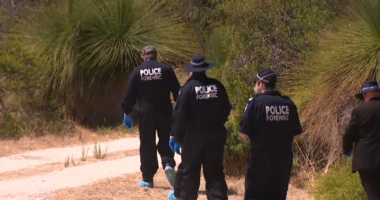Share this @internewscast.com
President Donald Trump listens during a swearing-in ceremony for Dr. Mehmet Oz as Administrator of the Centers for Medicare and Medicaid Services in the Oval Office of the White House on Friday, April 18, 2025, in Washington (AP Photo/Alex Brandon).
A federal judge in California has issued a preliminary injunction preventing the Trump administration from deporting a Venezuelan man to a notorious prison camp in El Salvador without providing him with at least two weeks’ notice of “any” removal attempt, according to her order.
U.S. District Judge Sunshine S. Sykes, appointed by Joe Biden, approved a request on Wednesday to change a temporary restraining order (TRO) she issued on April 25 into a preliminary injunction for Yostin Sleiker Gutierrez-Contreras, who arrived in the U.S. in May 2024 and was listed in the Immigration and Customs Enforcement (ICE) biometric reporting database.
Sykes wrote that, as she previously found, Gutierrez-Contreras raises “a serious question” about whether his removal under the 18th-century Alien Enemies Act (AEA) — a rarely-used wartime law — would violate his due process rights without a 14-day notice. The TRO she issued in April had required such notice, and Wednesday’s ruling now bars the government from deporting him without two-weeks’ notice until a final judgment is issued. Because the case is not a class-action lawsuit, the ruling only applies to Gutierrez-Contreras.
“Maintaining the status quo is still required to prevent the immediate and irreparable injury that may occur,” Sykes said.
Love true crime? Sign up for our newsletter, The Law&Crime Docket, to get the latest real-life crime stories delivered right to your inbox.
In September 2024, Gutierrez-Contreras reported to ICE’s Enforcement and Removal Operations in San Bernardino, California, where authorities determined that he “had a possible affiliation” with the Venezuelan gang Tren de Aragua (TdA) based on tattoos he had.
Gutierrez-Contreras “vigorously dispute[ed] any TdA affiliation” and was allowed to remain in the country under supervision. He allegedly maintained “perfect compliance” with his supervision, but that didn’t stop federal agents from taking Gutierrez-Contreras into custody on March 19. A judge ordered him released with pretrial conditions on March 26, but ICE officials immediately took him back into custody.
On April 12, Gutierrez-Contreras’ counsel learned that the government was planning on removing him to El Salvador under the AEA. He was transferred from California to a facility in Texas two days later.
On Wednesday, Sykes cited U.S. Supreme Court precedent requiring that individuals detained under the Alien Enemies Act “must receive notice … that they are subject to removal under the Act[,]” and that the notice must be provided “within a reasonable time and in such a manner as will allow them to actually seek habeas relief in the proper venue before such removal occurs.”
The government had previously failed to provide the court with what it considered to be notice “within a reasonable time” under the Supreme Court’s requirement, according to Sykes.
The Trump administration eventually managed to file a notice for Gutierrez-Contreras and what they believed a reasonable time would be — a “limited window” of 12 hours — but the paperwork was “inadequate,” according to Sykes, for multiple reasons.
“First, respondents’ notice form is only written in English, says nothing about a person’s right to seek review of their AEA determination, and says nothing about their limited window of 12 hours to express intent to file a habeas petition before they are placed on a plane for removal,” Sykes said. “Further, this form does nothing to provide notice as to the reasons for their AEA designation for removal and the court has no guarantee that respondents will read it to detainees in a language they understand other than respondents’ word that they will,” the judge added.
Sykes stated that the government has failed to provide “any information” to substantiate concerns the DOJ has raised about compromising operational safety and other reasons for not having to give 14-day notice.
“Instead, respondents seemingly expect the court to rely on their contention without providing specific examples and essentially blindly trust their word, just as they did when they insisted the government had developed adequate procedures for providing individuals under the AEA with reasonable notice of their removal in their opposition to the TRO,” she wrote.
Sykes pointed to the case of Kilmar Abrego Garcia, a protected father from Maryland who attorneys say was wrongly deported to El Salvador under the Trump administration with no effort made to facilitate his return.
“If the United States erroneously removed an individual to another country based on the Proclamation, a substantial likelihood exists that the individual could not be returned to the United States,” Sykes said, citing the case.
The government argues that Gutierrez-Contreras’ claim of injury is “purely speculative,” asserting that he hasn’t been designated an “alien enemy” and that the Department of Homeland Security has established adequate notice procedures to challenge any future removal under the AEA. It previously claimed that granting relief would irreparably harm foreign policy, but the DOJ failed to explain how “other than quoting various cases warning about the ‘dangers of judicial interference in the conduct of foreign policy,”” according to Sykes.
“Again, the court will not rely solely on Respondents’ word when an individual’s due process rights are concerned,” the judge concluded.
















